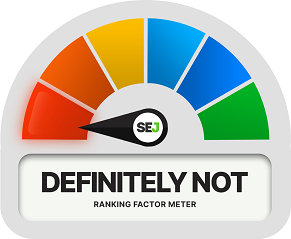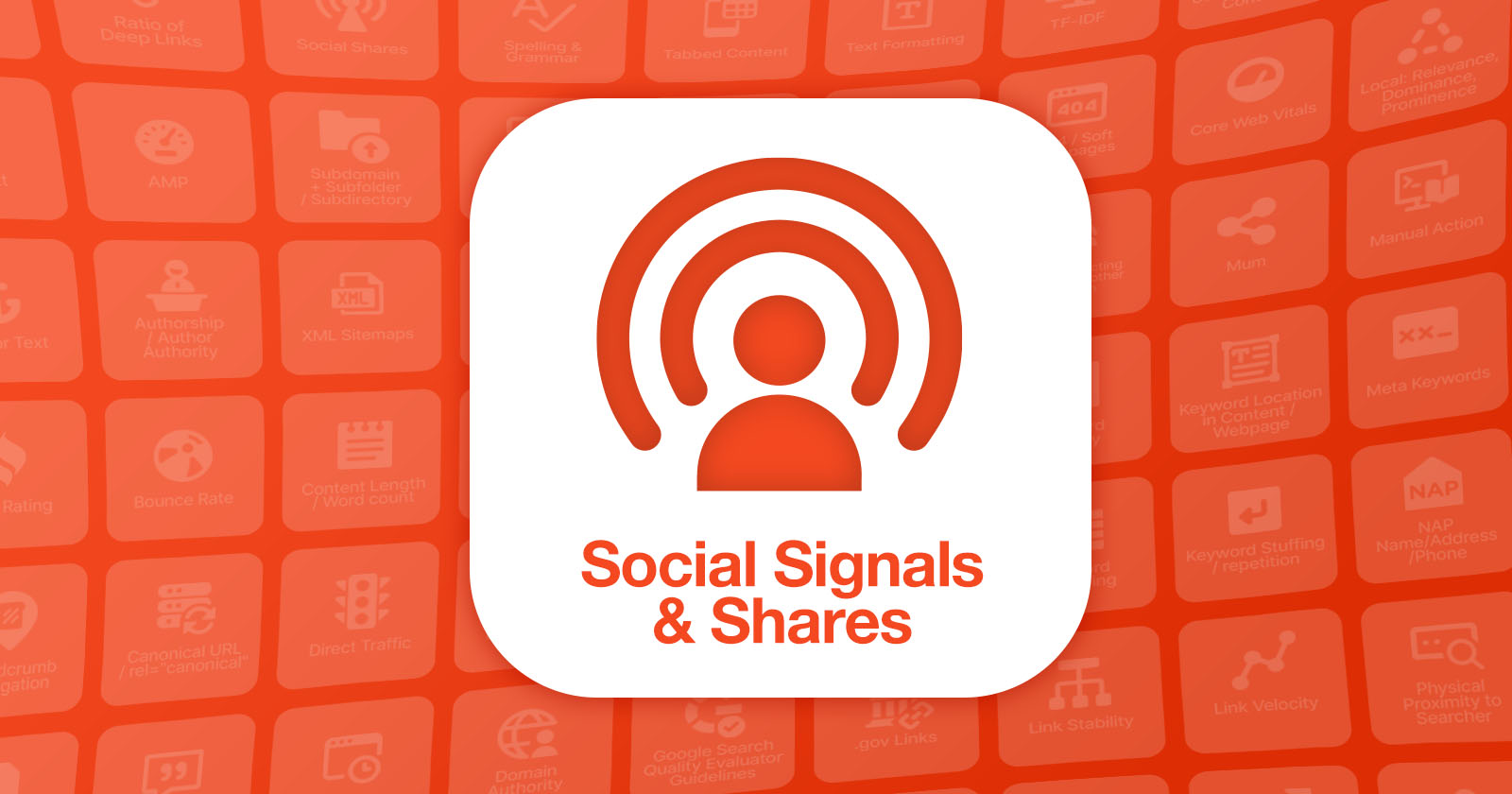Do social signals affect search rankings?
In a world of ever-evolving social networks and platforms, can engagement on one social network over another help you get better visibility in Google search engine results?
Let’s explore social signals as a Google ranking factor to determine their effect on search rankings.
Read more about ranking factors in SEJ’s Google Ranking Factors: Fact Or Fiction ebook.
The Claim: Social Signals Are A Ranking Factor
Social signals are engagement from social media users with content you have shared from your website.
Here are some examples of social signals.
- Someone shares a link to a page on your website in a public post on Facebook. The post receives likes, comments, and additional shares.
- Someone shares a link to a page on your website in a public tweet on Twitter. The tweet receives replies, likes, and retweets.
The Evidence For Social Signals As A Ranking Factor
Google does seem to care about social media. In the Search Engine Optimization (SEO) Starter Guide, Google acknowledges that compelling content gets shared, and organic buzz will build your website’s reputation.
“Creating compelling and useful content will likely influence your website more than any of the other factors discussed here. Users know good content when they see it and will likely want to direct other users to it. This could be through blog posts, social media services, email, forums, or other means.
Organic or word-of-mouth buzz is what helps build your site’s reputation with both users and Google, and it rarely comes without quality content.”
Later, when referring to website promotion, Google suggests knowing about social media sites because:
“Sites built around user interaction and sharing have made it easier to match interested groups of people up with relevant content.”
Inside Google Analytics, there is a section for Social reports. According to Google Analytics:
“Social analytics provides you with the tools to measure the impact of social. You can identify high value networks and content, track on-site and off-site user interaction with your content, and tie it all back to your bottom line revenue through goals and conversions.”
Google believes social profiles are important, especially to local businesses. Google Business Profiles gathers information from various sources – including social profiles – to give potential consumers a complete view of the local business.
Google also offers advice for anyone with a Knowledge Graph panel on updating their information, including social profiles.
While Google does seem to place importance on social profiles, it doesn’t necessarily mean that social signals can lead to better rankings.
In 2010, Matt Cutts, former head of the Webspam team, received a question asking how Google rates links from sites like Twitter and Facebook to a new website. He responded that Google treats links the same, and it doesn’t matter if they come from a .gov or .edu, or Twitter or Facebook.
The only catch would be links shared on profiles that aren’t public. If Google can’t fetch or crawl the profile page, it can’t see the link.
Later, in December 2010, Cutts received a similar question, referring to an article that suggested Google used links from Twitter and Facebook in search.
Cutts answered that although they didn’t use social signals for rankings in the past, Google had implemented social links as ranking signals at the time of the video. The link to the article was included with the video from Google Search Central for more details.
In 2013, Google filed a patent that references searching content of prominent users of social networks. In one section, the patent mentions how interactions by members of a user’s social graph can be used as social signals.
“Interactions performed by members of the user’s social graph can be used as social signals to adjust rankings of corresponding search results. For example, if a search query identifies results that include a resource that has been so identified by a member of the user’s social graph, this result can be boosted relative to other general search results responsive to the user’s query.
The boosting factor could be based on, for example, the number of friends who endorsed the identified resource or a top affinity to a friend who endorsed the identified resource.
Boosting can also be based on authorship (e.g., what is the relationship or affinity with the individual that endorsed the resource), or the type of endorsement did the member of the user’s social graph provide (e.g., an explicit endorsement by starring a result or page or an implicit endorsement by visiting the resource or commenting on a posting).”
While the patent shows Google’s interest in boosting resources in search results based on social signals, it doesn’t mean they applied it to the algorithm.
Fast forward to 2014, when someone again asked Cutts if Facebook and Twitter signals are part of Google’s algorithm. He responded that Google did not include signals such as the number of followers or likes in the algorithm. You can’t assume that because a signal exists on Twitter or Facebook, Google picks it up.
The Evidence Against Social Signals As A Ranking Factor
A few months later, Cutts answered this question:
“As Google continues to add social signals to the algorithm, how do you separate simple popularity from true authority?”
In his response, he says there is an “assumption” in the first part of his question, adding social signals to the algorithm, which he dismisses.
In 2015, John Mueller, a search advocate at Google, said that social signals do not directly help in organic rankings.
Links in most social posts are nofollowed. They won’t help with organic rankings. However, the social posts that link to your website could appear in search results.
In 2016, Mueller received a tweet asking if social media tags do any good for on-page SEO. His response:
“No, I’d use links to social media as a way to add value to users, not in the hope that they improve rankings.”
In 2017, Gary Illyes, Chief of Sunshine and Happiness at Google, mentioned social media twice in a link discussion. First:
“And that’s where social media comes handy. It’s not because SEs will rank you better, that’s BS, but because you market your content”
“Also, for the record, PageRank wise most social media links count as much as a single drop in an ocean.”
In 2019, Mueller joked in response to a guide on TikTok:
“Do people put links in Tiktok videos? #seo #numberoneranking #follow #growthhacking”
In 2021, Mueller joked in response to the number of likes a particular tweet was receiving:
“Sorry, we don’t use likes as a ranking factor.”
Later in August 2021, Mueller was asked if clicks via emails could impact rankings. He replied:
“No effect on SEO. Like ads, like social media. It’s good to have multiple separate sources of traffic to your website, and not everything needs to have an SEO effect.”
A few months later, Mueller was asked if social media directly or indirectly affected SEO. He answered:
“If I give you advice on Twitter which helps improve your website’s visibility in search, would that be an indirect effect of social signals on SEO?”
The joking response is a clue to their sentiment about social signals. They don’t put much stock in them.
Check out our verdicts on other ranking factors in the Ranking Factors: Fact Or Fiction ebook.
Social Signals As A Ranking Factor: Our Verdict

It’s a bit confusing whether social signals affect organic search rankings. Between 2010 and 2014, Google may have experimented with social signals in search results.
Plus, there are scenarios where social media can help your SEO efforts. While social signals may not be a ranking factor, social profiles and links can affect your brand’s appearance in search results.
Ultimately, it seems that Google may have used social signals in the past to create better results for users. But now, social signals seem to be a thing of Google’s past.
Featured Image: Paulo Bobita/Search Engine Journal





